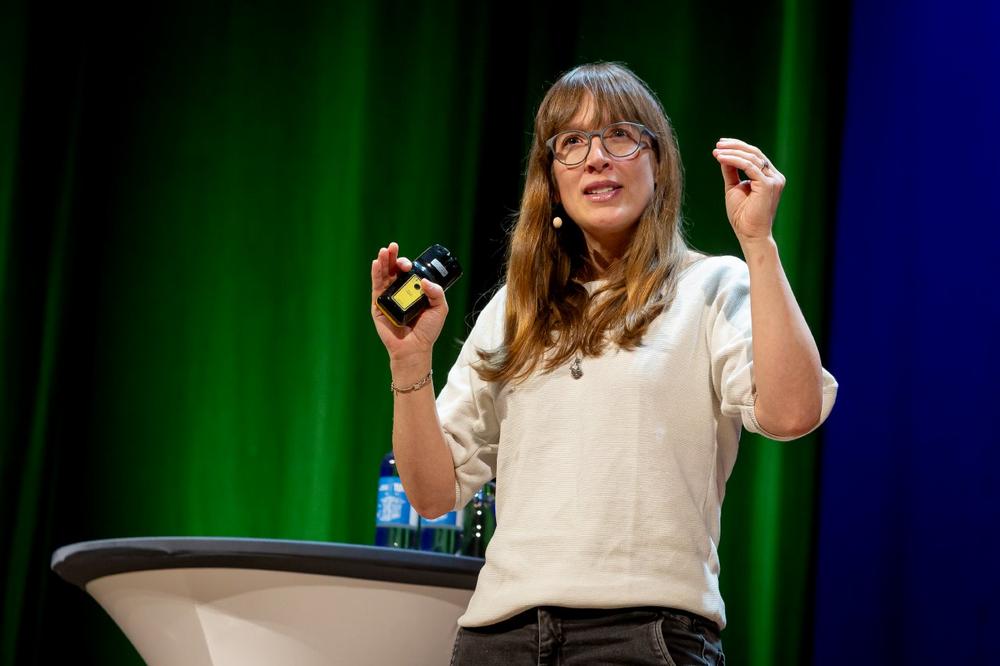This is how Dr. Insa Thiele-Eich, meteorologist, climate researcher with a doctorate and budding astronaut, recalls the key moment when she was infected with space fever at the 23rd Bürger-Uni of the TUM Campus Heilbronn in cooperation with the Heilbronner Stimme and the Dieter Schwarz Foundation. For the daughter of space traveler Gerhard Thiele, this path would not be an easy one. Even today, women in space travel have to contend with considerable prejudice. What’s more, Insa Thiele-Eich faced three almost impossible challenges: At 1.60 meters tall, she was five centimetres below the minimum height previously prescribed for space travelers. As a German, she was only allowed to apply to the European Space Agency (ESA,) but not to NASA. In addition, she was a vegetarian – strictly forbidden for astronauts at the time.
Tough as nails training
So Thiele-Eich studied meteorology and learned how the problems often solve themselves: The minimum body height was lowered to 1.53 meters, and the ban on vegetarian food was lifted. Now the third challenge remained: in 2008, she did not yet meet all of the ESA’s application criteria, and the next selection round would not take place until 2021. Should Insa Thiele-Eich wait that long to fulfill her lifelong dream?
In fact, almost another decade passed before the scientist suddenly took a significant step towards her dream: the foundation "Die Astronautin" was established in 2017. Its goal: to take a German woman into space for the first time. She is to fly to the International Space Station on board a Space X capsule and carry out a 14-day research mission. Two women have survived the nerve-wracking selection process: Suzanna Randall, who also recently appeared as a guest speaker at the TUM Campus Heilbronn, and Insa Thiele-Eich. But that was just the beginning of the real work, because the three-stage preparatory training was a tough one. It included parabolic flights to experience the feeling of weightlessness, centrifuge training to simulate the increased gravity during a rocket launch, a moon analog simulation in which certain tasks had to be performed underwater in a spacesuit, and cave training in complete isolation at an ambient temperature of nine degrees.
Effects on the female body
There are still some hurdles to overcome: Funding for the mission is by no means secure. Insa Thiele-Eich complains about the lack of support from politicians. And even if the mission goes ahead, it is possible that Suzanna Randall will be selected as the first German woman in space instead of her. Thiele-Eich would take it sportingly: "Then I’ll be the second one." She tries to compensate for the negative effect of her possible space flight on the climate by regularly drawing attention to climate change. Her mission would also be based on a plant-based diet. Her second passion, the promotion of women in space travel, will also be taken into account: the mission should research the effects of space travel on the female body.
But what remains of the eight-year-old girl who once discovered her fascination with space? Insatiable curiosity, says Insa Thiele-Eich. "I may never find out whether there are other children somewhere in our universe who are looking up at the night sky at the same time as me. But I know that there is something new to discover every day if you stay curious."
Of course, there are also new things to discover at the Bürger-Uni in Heilbronn, where Prof. Alena Buyx from the TUM School of Medicine and Health will speak on June 13, 2024 on the topic of "Medical ethics – ethical issues in hospitals, research and politics".
Die TUM Campus Heilbronn gGmbH
Bildungscampus 2
74076 Heilbronn
Telefon: +49 (0) 7131 264180
Telefax: +49 (7131) 645636-27
https://www.chn.tum.de/de
E-Mail: niklas.weinstok@tumheilbronn-ggmbh.de
![]()

